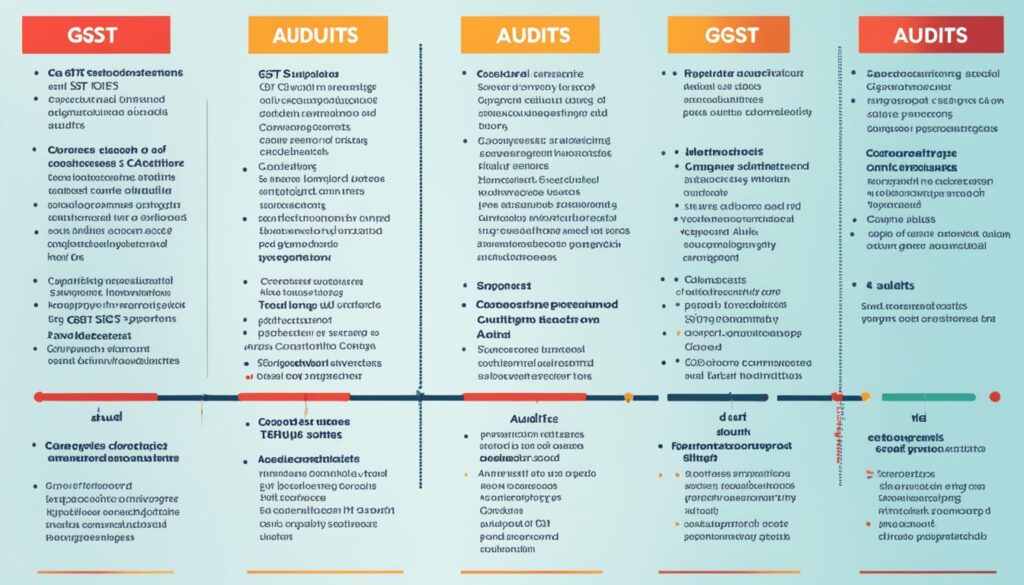Hyderabad , India
Have you ever thought about how a small mistake in tax could risk your startup’s future? Navigating the complex world of GST is key for Indian startups. With over 1.3 billion people in the market, the GST Audit for Indian Startups is crucial for staying compliant and growing.
Since July 1, 2017, GST has changed how businesses handle taxes, making things simpler under one roof. But auditing is still vital. It helps us pay the right taxes and get refunds, protecting us from big fines that could hurt our finances. At Am Accountable, we offer GST Audit Services designed for startups, making this complex process easier.
Key Takeaways
- The Goods and Services Tax (GST) law requires annual audits to ensure businesses follow the rules.
- Startups need to know when they must get a GST audit based on their sales.
- Many startups struggle with compliance and often don’t make it past two years.
- Working with outside experts in compliance lets startups focus on growing while handling legal stuff.
- Not following tax audit rules can lead to big fines, showing why keeping accurate records is key.
Introduction to GST and Its Importance for Startups
The Goods and Services Tax (GST) changed India’s tax system, making it clearer and more structured for businesses, especially startups. It brought many taxpayers who avoided taxes before into the open. This change makes following the rules clearer and shows how crucial GST is for startups to work fairly.
Now, more people have jobs thanks to GST, which helps new businesses grow. Startups gain a lot from not having to deal with confusing taxes anymore. The new tax system is clear, letting companies focus on creating new things instead of tax issues. It also cuts down on costs for startups by combining many taxes into one.
One big plus of registering for GST is getting to claim Input Tax Credit (ITC). This is very important for businesses with little money, helping them pay less tax and keep more cash. It also makes shipping and moving goods cheaper, helping startups grow and reach more customers.
With GST, businesses can grow bigger without needing to register in every state. This lets startups reach more people, which can really help them grow. The GST Composition Scheme is also great for small businesses, offering lower taxes.
But, startups face some challenges with GST, like dealing with many tax offices and keeping accurate records. They need to understand taxes, manage ITC, and file on time. Using technology, like GST software, can make following the rules easier. This lets startups focus more on their main work.
In the end, GST makes taxes simpler for startups, saving time and making things run smoother. It helps startups by meeting their specific needs, which is key for growth and new ideas in India.
What is a GST Audit?
A GST audit is a detailed check of a business’s financial records and returns. It makes sure the business’s income and taxes match what they reported. Experts do this audit to ensure businesses follow GST rules and are open about their finances.
Over time, GST audits have changed a lot. Before, businesses with sales over Rs. 5 crores had to get audited by certified accountants. Now, some businesses with lower sales can self-certify. Those with sales over Rs. 2 crores might need an audit under certain conditions.
Understanding the GST Audit Timeline is key. It includes different types of audits, deadlines, and fines. Regular audits check if businesses follow the rules. Special audits look into specific tax issues. Submitting audit reports on time, like GSTR-9C and GSTR-9, is crucial to avoid fines.
Getting ready for a GST audit is crucial for businesses. Keeping financial records right makes the audit go smoother and lowers the chance of mistakes. Knowing what the audit is about helps startups handle taxes better. This lets them grow and expand without trouble.
GST Audit for Indian Startups
Startups need to focus on GST Compliance for Startups to avoid big problems. Not following GST rules can lead to heavy fines and slow down growth. To stay on track, they must register for GST, file returns on time, and keep accurate financial records. This helps protect their business from risks related to not following the rules.
Overview of GST Compliance for Startups
Startups often struggle with GST compliance. The rule change in FY 2020-21 made things easier for some businesses. But, those making more than Rs. 2 crore a year still need a GST audit to find any mistakes. Also, new rules for filing GSTR-9 and GSTR-9C make things easier for smaller businesses.
The Role of GST Audits in Startup Growth
GST Audit for Startups helps check the financial health of a business. Finding errors early helps with following the rules and builds trust. A clean audit makes a startup look good to investors who want clear financial info. Strong GST Audit Services build trust and help the startup grow.
| Audit Type | Requirements | Turnover Threshold |
|---|---|---|
| Regular Audit | Mandatory for GST registered individuals | Over Rs. 2 crore |
| Special Audit | Conducted by Assistant Commissioner | Case-dependent |
| Self-Certified Audit | Applicable for certain taxpayers | Rs. 5 crore and below |
| Voluntary Audit | For startups seeking to establish credibility | No specific threshold |
As taxes change, keeping up with GST Compliance for Startups is key. Using good GST Audit Services helps startups deal with these changes. This sets a strong base for success over time.
Types of GST Audits Applicable to Startups
Startups need to know about the different audits they might face in the Goods and Services Tax (GST) system. They should get ready for regular audits by tax authorities and special audits in certain situations. Knowing about these audits helps us avoid risks and follow the rules well.
Regular GST Audits by Tax Authorities
The standard audit by Tax Authorities checks if a startup follows tax laws. Startups with more than Rs. 2 crores in annual sales must do this audit. It checks their GST filings and if they follow the rules. Trained professionals like Chartered Accountants or Cost Accountants do these audits to find mistakes and check compliance.
- Designed to assess compliance based on annual returns and records.
- Must be finished within a set time, with reports sent online.
- If not following the rules, there can be penalties.
Special Audits: When and Why?
Special Audits are more detailed and happen when tax authorities want to look closer at a startup. They start when there are doubts about a startup’s financial records or if things are too complex.
- Done by Chartered Accountants or Cost Accountants chosen by the commissioner.
- Look into deeper aspects of GST compliance not covered in regular audits.
- Can start because of a higher turnover or worries about not following the rules.
To prepare well, keep accurate records and get help from a skilled GST audit consultant. They know about GST registration, filing returns, and representing in audits. This can really help us follow the rules better.

| Audit Type | Conducting Authority | Focus Area | Turnover Requirement |
|---|---|---|---|
| Regular GST Audit | Tax Authorities | Compliance Verification | Above Rs. 2 Crores |
| Special Audit | Nominated Accountant | Detailed Investigation | Varies (based on scrutiny) |
In conclusion, knowing about GST Audit Types helps us take the right steps for following the rules and avoiding problems in our business.
Legal Framework for GST Audits
The GST audit legal compliance in India is based on clear legal rules. The Central Goods and Services Tax Act (CGST) sets the guidelines for audits. It’s vital to follow these rules, keep to deadlines, and choose the right auditors.
Before 2019-20, businesses with over Rs 2 crore in sales needed a CA or CMA to do their audit. Now, from 2020-21, they can self-certify in Form GSTR-9C. This change makes it easier for startups to follow the rules.
There are many types of GST assessments, like Self Assessment and Scrutiny Assessment. The tax authorities also do different audits, such as General Audits and Special Audits for complex cases. Knowing about these audits helps startups stay in line with the law.
Startups can get clarifications from tax authorities through the Advance Ruling system, avoiding expensive court battles. They must file GSTR-1 and GSTR-2 on time each month. This keeps them out of trouble with the tax man.
| Audit Type | Description |
|---|---|
| General Audit | Conducted by the Commissioner; may cover all compliance aspects. |
| Special Audit | Initiated in complex cases; involves a CA or CMA for thorough scrutiny. |
| Self Assessment | Allows businesses to report their own compliance and tax liabilities. |
| Provisional Assessment | Temporary assessment conducted before final figures are available. |
| Scrutiny Assessment | Detailed examination of returns to validate correctness. |
| Best Judgement Assessment | Assessment based on the authority’s discretion in cases of non-compliance. |
Understanding GST audit legal compliance and adapting to GST regulations helps startups with GST audits. Staying compliant avoids fines and puts businesses ahead in the market.
Threshold Limits for GST Audit
For Indian startups, knowing the GST Audit Threshold Limits is key. There are specific turnover rules that decide if a business needs an audit. Startups and small businesses must check their finances often. As they grow, hitting certain sales marks can mean they must do audits, which affects their resources and how they follow the rules.
Turnover Criteria for Mandatory GST Auditing
The annual GST audit limit for most businesses is Rs 2 crore. Those in the composition scheme have a lower limit of Rs 1 crore. Startups need to watch their earnings closely. If a business makes more than Rs 2 crore, it must go through a GST audit, as the CGST Act says in Section 35(5).
A GST audit might seem scary, but it’s a chance to make sure you’re following the rules and your finances are right. There are two kinds of GST audits: General and Special. Companies need to get ready for these audits and follow all the rules. They also need to tell a registered person at least 15 days before the audit starts.
If you don’t follow the audit rules, you could face big fines and even jail time. These penalties can be from Rs 10,000 to Rs 1,00,000 and jail from 6 months to 5 years. To help startups, we suggest they look into guidance on filing GST returns online. This can make them more aware of the audit rules and give them the right info.
Preparing for a GST Audit
Getting ready for a GST audit means being very careful with our records. We need to keep everything in order and file on time. Having a detailed GST Audit Checklist helps make the audit easier and shows we’re following the rules well.
Maintaining Accurate Records
For a startup, having correct financial records is key for a good audit. We must keep important papers like sales invoices, input tax credits, and GST returns. Checking our accounts often helps spot mistakes early.
Fixing these problems before the audit shows we’re serious about following GST rules.
Importance of Timely GST Filing
Filing GST on time is very important. It lowers the chance of getting penalties and shows we’re reliable with our paperwork. For businesses making over Rs. 5 crores, using Form GSTR-9C is a must.
We need to send in all documents like the GST annual return and reconciliation statement on time to avoid problems.
Keeping these things in mind makes us ready for GST audits. It makes the audit process smoother and keeps our finances in check. Being proactive in our Preparing for GST Audit journey protects our business and builds a strong base.
Common Challenges Faced During GST Audits
Startups often face many challenges during GST audits. These challenges can come from different areas, making obstacles in GST compliance a big issue. One big problem is how audits can disrupt normal work, which can be tough on resources. Startups, especially new ones, find it hard to keep up with the need for detailed documents and correct financial records.
Understanding GST rules is hard, which can lead to disagreements with tax officials. These disagreements can take up a lot of time and resources. If there are mistakes, tax authorities might do special audits. These audits look closely at financial records and transactions, making things even harder.
Startups also have to deal with different types of audits, like regular, annual return, and refund audits. Each type has its own rules and needs, adding to the obstacles in GST compliance. Regular audits happen often, and annual return audits check if everything is correct. Keeping accurate records is key.
Common mistakes can cause audit problems. Things like wrong input tax credits, wrong reports, and missing documents often happen. To avoid these, we need to make sure tax credits are right, double-check our reports before sending them, and keep up with changes in GST laws.
Understanding our rights during audits is important. We can have someone represent us and ask for clarification on audit matters. But, we also have to work with auditors and give them the documents they ask for.
With more audits and notices going out, having a good feedback system, like the Model GST Audit Manual suggests, can make audits better. Good communication between State and Central audit officers can also make things easier, making following the rules less hard.
| Type of Audit | Frequency | Focus |
|---|---|---|
| Regular Audit | Quarterly | Overall compliance and accuracy |
| Annual Return Audit | Yearly | Verification of annual returns |
| Refund Audit | As needed | Verification of refund claims |
| Special Audit | As needed | Detailed examination of discrepancies |
| Transition Audit | Initial transition phase | Accuracy of GST transition |
Dealing with these GST Audit Challenges early on is key for our startups to grow and succeed. It helps make following the rules easier and smoother.
Benefits of Conducting GST Audits for Startups
In the fast-paced world of startups, the benefits of GST Audits are huge. Regular audits help us spot errors in our financial reports early. This way, we can fix problems before they get worse. It’s a key step to keep our business safe and follow India’s GST rules.
We see audits as a chance to make our business stronger. All startups should see them this way too.
Identifying Errors and Rectifying Issues Before They Escalate
A GST audit checks our financial records and tax returns closely. It helps us find any fraud or mistakes that might be missed. Catching these problems early lowers risks and helps us make more money.
This shows how important GST Audits are for startups.
Building Credibility with Investors and Stakeholders
Being open and thorough in our audits builds trust with our investors and partners. A clean audit shows we’re serious about being responsible. This is key for getting funding and building strong relationships.
As our startups grow, using what we learn from GST audits will make our business stronger. It will help us stand out in a tough market.
FAQ
What is the purpose of a GST audit for Indian startups?
The main goal of a GST audit for Indian startups is to check if they follow GST laws. It makes sure the declared sales, taxes paid, and refunds claimed are correct. This process helps keep things transparent and avoids big penalties, keeping the startup’s finances safe.
When should startups register for GST?
Startups need to register for GST when their total sales hit Rs. 20 lakhs (Rs. 10 lakhs for some states). Registering on time is key to meeting GST rules and running smoothly.
What types of GST audits are applicable to startups?
There are two main types of GST audits for startups. The first is regular audits by tax authorities. The second is special audits for specific issues found during checks. Knowing these types helps startups get ready and lower risks.
How can startups prepare for a GST audit?
Startups can get ready for a GST audit by keeping their financial records right. This includes sales and purchase invoices, input tax credits, and on-time GST filings. Checking accounts often helps spot and fix mistakes early, making audits easier.
What are the potential challenges during a GST audit?
During a GST audit, startups might face issues like disruptions, extra work, and disagreements with tax officials over rules. Good accounting and being well-prepared are key to handling these challenges and making the audit go smoothly.
How does a clean GST audit benefit startups?
A clean GST audit boosts a startup’s trust with investors and stakeholders, making it easier to get funding. It also finds mistakes early, helping avoid financial problems.
What is the GST audit process?
The GST audit process checks a startup’s financial records, returns, and important documents to make sure they follow GST rules. This process follows legal rules and timelines set by GST laws.
What are the consequences of failing GST compliance?
Not following GST rules can lead to big penalties, money losses, and legal trouble. It’s crucial for startups to focus on GST compliance to avoid these bad outcomes.
How does GST affect cash flow for startups?
Being GST compliant lets startups claim Input Tax Credit (ITC), which helps with cash flow by lowering taxes. This supports better operations and financial health.
What support can startups receive for GST audits?
Startups can get help from firms like Am Accountable for GST audits. They offer advice and virtual accounting to help with GST rules and audits.








